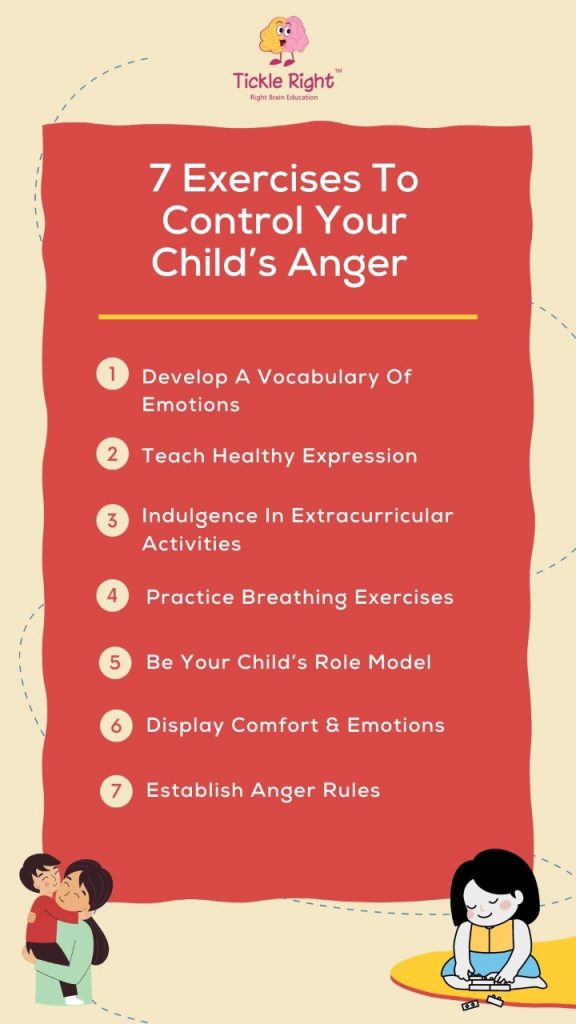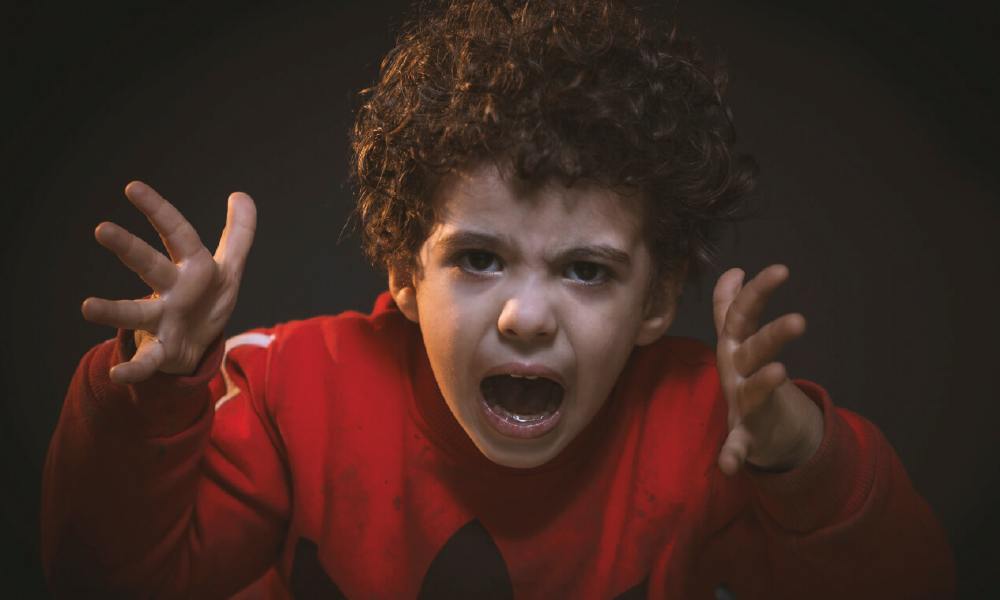Anger Management: 7 Exercises To Control Your Child’s Anger
Anger Management: 7 Exercises To Control Your Child’s Anger
Too much anger or aggression in kids is a result of mismanaged feelings. Aren’t they? Feeling out of control or impulse reactions from young children is a common sign of anger manifestation. These signs reflect multitudinous repercussions over time. As parents, you must know the techniques for relaxing your child in such situations. Because an eye for an eye would not tame your child’s aggression.
Reciprocating the anger at your child constantly usually backfires in a form of rough emotions. It can also make your little one more resentful. However, when a child is born, their mind is right dominant. Which makes it essential for you to be loving & patient with your child. Don’t let your child lose their right brain dominance by only being strict & disciplined. Your little one needs a loving environment to learn things & sway their anger in seconds.
You can tap into your child’s potential with the benefits of right-brain training. This gives a boost to a child’s mind to develop creativity & empathy. When they’ll be in a position to understand others’ feelings, it will help them control their anger. You must make them learn the difference between healthy & unhealthy anger. We at Tickle Right recommend cutting out on negative feelings & channelizing their energy positively.
Anger Management For Kids
Getting angry in certain circumstances is completely normal even for kids. After all, they are behavioral reactions. However, there is an underlying difference between normal emotions & aggressive behavior. Your child’s conduct can also take the form of temper tantrums & continued frustration as a behavioral pattern. The purpose of anger management for kids is to psychologically control their feelings & the arousal that follows them.
It’s suggested that babies manifest excellent results because of their right brain dominance. You can treat anger management in children by making the best of their potential. Your child must not be deprived of their right brain abilities in a world of left-brain dominance. Harsh discipline of strict actions will stimulate your child’s left brain. Whereas, the right way is to involve your child in activities & exercises that will trigger rich creativity in them.
7 Exercises To Control Your Child’s Anger
A child’s anger or tantrums has to tame by staying calm & avoiding triggers for them. As their emotions may result in a form of lashing, the rise of negative reactions is not uncommon here. Your child may scream, cry, bite, or throw objects by creating a stressful situation for themselves. It becomes very important to manage their emotions right away because your child is unable to handle the frustration.
Help your child get over this overwhelming situation by adopting a problem-solving approach listed below:

1. Develop A Vocabulary Of Emotions
Your child must be familiar with their emotions. They must be in a position to let you know what they are feeling & develop an alternative approach to tackle anger. When your little one learns the essence of different words like angry, upset, furious, irritated, & enraged. It helps them convey their anger beforehand & differently. This can also be a substitute for hitting, crying, kicking, or throwing objects to express anger. It’s important to have a conversation with your child & assert optimism in such situations.
2. Teach Healthy Expression
Who doesn’t get angry? Merely everyone. It’s important to protect your child from any adult problems if any. A healthy way to handle angry feelings would be to take your child to another room or an isolated area, away from the cause at the moment. Because kds must know the right way to express their frustration or anger. You can offer comforting objects like a coloring book, crayons, pens, or a music player to calm them. Your child can also take time out of the situation. As parents, you can use an alternative set of words to calm them. Instead of asserting, “Why are you throwing objects?”, you can say, “Walk into another room when you get angry.”
3. Involvement In Extracurricular Activities
Extracurricular activities are always a blissful experience for kids. Aren’t they? Extracurricular activities for kids at any age help channel their bursts of energy into enriched creativity. Not only this but it also focuses on skill-building & stimulates excellence. Activities like art, music, drama, sports, and dance enhance social skills & disciplinary approach. You can ask your child to indulge in these activities when they are angry. This will give them a sense of relaxation. Also an opportunity to put down their anger & lighten their mood.
4. Practice Breathing Exercises
Breathing exercises for kids are very helpful when they are furious or angry. When your child is going through such emotional reactions, insist on counting to five. Ask them to take a pause & repeat it again for quick results. Whenever your child does this, their body goes into a rest & relaxation mode. It helps fetch more oxygen into the bloodstream & creates a physical impact on the body. This is a way to eliminate stress & experience maximum relaxation.
5. Be Your Child’s Role Model
Young children have the tendency to imitate their parent’s actions & words. You must set a good example of how you react when you are angry. Your reactions have a great impact on your child’s mind. So, you must think through it before you react. Always refrain from lashing out or throwing objects while angry. If you’re willing to instill positive coping skills in your child, you must demonstrate the exact behavior. This helps your child deal with anger the right way.
6. Display Comfort & Emotions
It’s important to take some time out & show love & affection to your child. So, whenever your child is angry or furious, your physical presence adds a lot of meaning to calm your child. Lots of physical contact like cuddles, stroking, or a warm hug helps release natural chemicals in a child’s body. With that in mind, it also perceives to your child that you are present fot them. It helps your child express their feelings comfortably & makes them feel that you are here for their insecurities. Therefore, it’s important to make your child experience a sense of acceptance from you.
7. Establish Anger Rules
Anger rules are always helpful when it comes to specific anger management techniques. First of all, avoid exposing your child to violent shows or games at this age. Help your child understand the behavior that is accepted & reasonable when they are angry. Discuss these rules with your child & also follow through with some easy repercussions. This can be performing household chores or giving up on some of their favorite toys, and others. Furthermore with time, if your child follows these rules, you should also reward them for their efforts.
FAQs
-
What causes anger issues in a child?
The reason behind a child’s anger issues can be the following:
- Unresolved feelings
- Autism
- ADHD (Attention Deficit Hyperactivity Disorder)
- Anxiety
- Learning problems
-
How do you discipline a child with anger issues?
A child with anger issues must be calmed down the right way. It’s important to cultivate anger management skills in the following ways:
- Talk about managing their emotions the right way
- Set a good behavioral example as parents
- Formulate anger rules to keep them away from outbursts
- Avoid yelling at your child when they are angry
- Indulge them in other activities when they get angry
-
How can you help your child with anger management?
Here’s how you can help your child with effective anger management:
- Focus on creating a calm environment
- Avoid yelling or screaming at your child
- Show affection towards them when angry
- Listen to your child’s feelings & insecurities
- Walk your child to a quiet space to gain control
Takeaway

An angry child may become hard to deal with time. Therefore, the right way to manage them is by understanding their behavior & focusing on what’s best for them. You must engage your child in fun right-brain activities that give a boost to a child’s mind. It brings in creative excellence & empathy to understand the real interpretation of others’ feelings. This will help your child tame their angry reactions.

